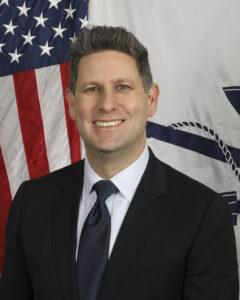The Navy is getting ready for the ‘meat cleaver” of cuts from a sequester if Congress does not pass a new appropriations bill before the new year, the service’s comptroller said this week.
According to the Fiscal Responsibility Act
that was passed earlier this year as part of a deal to raise the debt limit, if Congress does not pass appropriations bills before January 1, 2024, the bill imposes caps for all discretionary spending at 99 percent of fiscal year 2023 levels.

“If I get stuck at sequester, it’s a $15 billion dollar hit to the Department of the Navy. If I get stuck in a full year [Continuing Resolution] that’s $26 billion of misaligned funds. A 10th of the Navy’s budget is all screwed up,” Russell Rumbaugh, assistant secretary of the Navy for Financial Management and Comptroller, said during a Stimson Center event on October 16.
While these numbers match the last time Rumbaugh warned of fiscal repercussions for the Navy Department (Defense Daily, Sept. 13), he admitted he has not yet updated the numbers for the current Continuing Resolution (CR).
The current CR was signed in late September and largely maintains FY ‘23 funding levels, but includes an anomaly or exception for the Navy to send up to $621 million to procure the second Columbia-class nuclear-armed ballistic missile submarine, the future USS Wisconsin (SSBN-827) (Defense Daily, Oct. 3).
Navy officials consistently call the new SSBN their highest priority, with it set to replace the aging Ohio-class SSBNs as they retire and the program has lost nearly all of its extra production schedule margin.
Rumbaugh said a CR or sequester is “still real disruption” even with the anomaly.
“Submarines are so big, especially the nuclear deterrent submarines, are so big that each one counts as what’s called a new start, a new program. One of the very few anomalies we got in the CR this time. So the worst one, the one that made me worry about the future of the country – Congress did take care of, thank you,” he said.
Rumbaugh said the SSBN exception helps lower that $26 billion in misaligned funds “a little bit.”
However, if the sequester provision becomes reality, he said he has no choice in how it is administered because it will be done at the program, project and activity levels across all of the Defense Department.
While Rumbaugh said he expects they will be able to take Military Personnel funding off the table so the uniformed members do not have reduced pay, “But it means all my other accounts have to burn more. So like one and a half percent is what all of those others have.”
“The word we always used to use is meat cleaver, I don’t have a choice. One and a half percent of every tiny project, program and activity level. So it’s just pain, its just pain. Hilariously, it doesn’t take much preparation, right?”
Rumbaugh underscored that these budget issues are the backdrop while the Navy is still hoping for a funding increase from FY ’23 to ’24.
Regardless, he said, at the same time the Navy and Pentagon need an appropriations bill or another CR passed by November 17, and the administration wants supplemental funding for more Ukraine arms and may seek additional funding for Israel.
“Those things all make a difference in what we go do. All of that needs to be done.”
Rumbaugh said within the framework of budget uncertainty and CRs, his first task for his financial management team through the Navy Department is to help their commanders deal with these trends and not blame others or Congress first.
“Help your commander, help your boss. Why are you letting a contract in October when you’re not sure you’re gonna have money? Make sure we’re on a cycle, use the…we have a ton of flexibility, right? Everybody says ‘Oh the systems are so hard, and it’s so rigid.’ There are a ton of things we can do all the time. There’s a huge amount of opportunity for creativity that still stands well within the bounds of the guidance and oversight we’re doing. It’s my team’s responsibility to live up to that challenge.”
Rumbaugh noted while in the last 30 years there have been only six times when there was no appropriations bill passed by January 1, five times were in the past 10 years.
“Yeah, it’s a new world.”